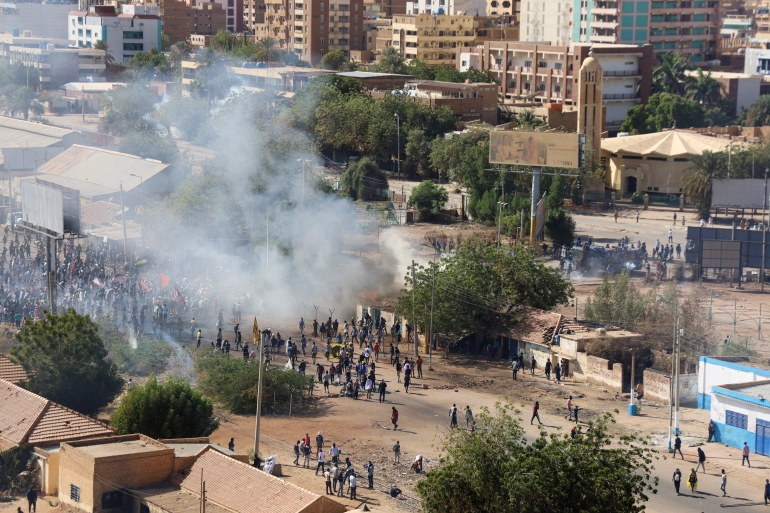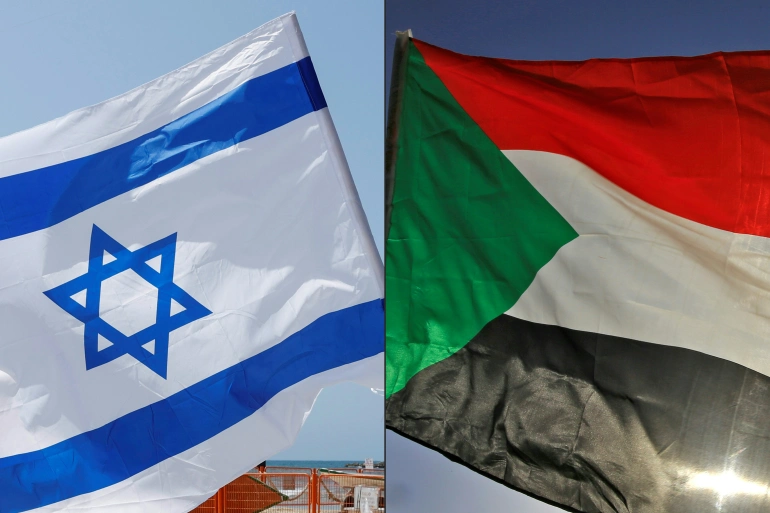•Military leader says intelligence sharing between Tel Aviv and Khartoum helped arrest suspected fighters in Sudan.
Sudan’s military leader General Abdel Fattah al-Burhan has made comments in which he dismissed Western threats of sanctions tied to protests in the country and discussed meetings between Sudanese and Israeli officials he said were for security cooperation, not politics.
In his first interview on state television since the coup, Burhan said on Saturday that Washington was receiving inaccurate information.
He also lauded ties with Israel, saying intelligence sharing between the two former adversaries helped arrest suspected fighters in his country.
Protesters have been on the streets for months since Burhan led a military coup in October last year that ended a civilian-military partnership that was meant to lead to democratic elections, a move that was also widely condemned by the international community.
He also lauded ties with Israel, saying intelligence sharing between the two former adversaries helped arrest suspected fighters in his country.
Protesters have been on the streets for months since Burhan led a military coup in October last year that ended a civilian-military partnership that was meant to lead to democratic elections, a move that was also widely condemned by the international community.
US officials have said they are looking into options to respond to the killing of at least 79 protesters, according to a toll by medics, and to moves to impede civilian-led government.
“Sanctions and the threat of them are not useful,” Burhan said in the interview, adding that he took personal responsibility for investigations of protester deaths and that five or six were ongoing.
He also said there were suspicions of involvement by “outside groups”, without elaborating.

Sudan and Israel normalised relations in 2020 as part of a series of US-brokered deals between Israel and four Arab countries.
The two countries have since crafted security and intelligence relationships that have seen officials meet often in unannounced trips.
The head of the ruling Sovereign Council said the intelligence exchange has enabled Sudan to dismantle and arrest suspected armed groups that “could have undermined the security of Sudan and the region”.
Israel has been silent on the October military coup and the ensuing unrest, indicating it intends to maintain normalised ties with Sudan.
Sudanese and Israeli officials exchanged unannounced visits in recent weeks. Most recently, a Sudanese security delegation visited Tel Aviv last week, following a visit by Israeli officials, including Mossad intelligence officers, to Khartoum in January.
The October, the then-Sudanese justice minister, Nasredeen Abdulbari, and Israeli cabinet ministers Idan Roll and Edawi Frej held a rare public meeting in Abu Dhabi.
The normalisation of ties with Israel paved the way for Sudan to reintegrate into the international community after two decades of isolation under former President Omar al-Bashir.
Sudan was once one of Israel’s fiercest rivals in the Arab world. It hosted the landmark Arab conference after the 1967 Middle East war at which eight Arab countries vowed never to make peace with Israel.
Credit | Aljazeerah

